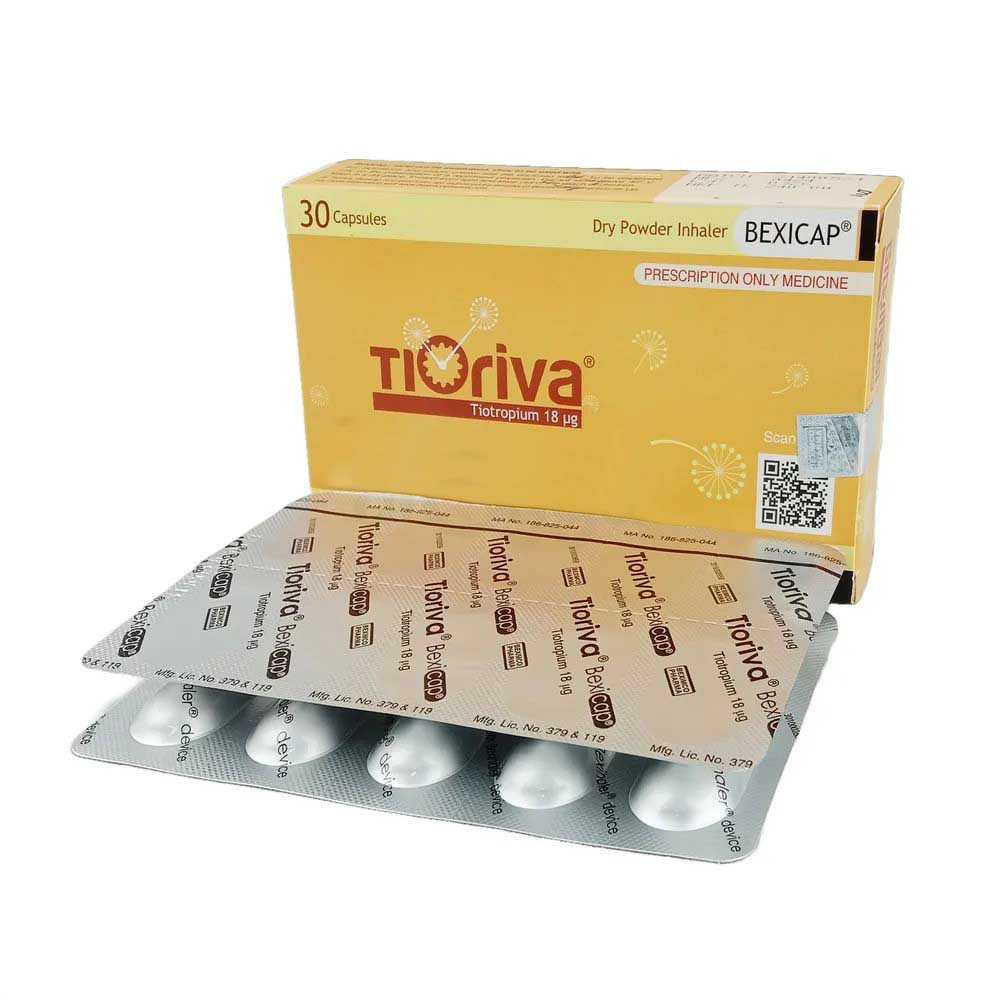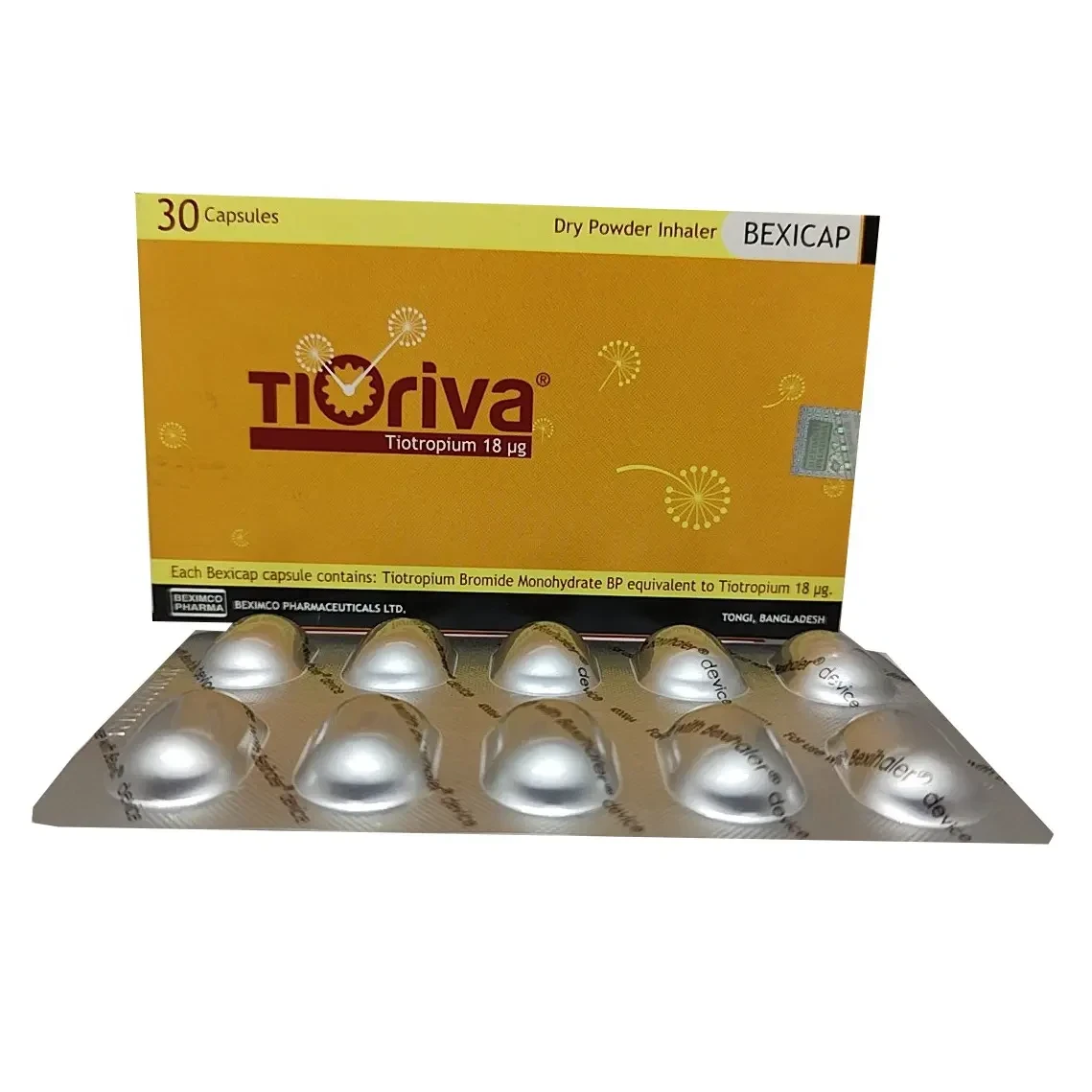Tioriva Dry Powder Inhalation Capsule (DPI)
Pack Images
18 mcg
Unit Price:
৳ 8.00
(3 x 10: ৳ 240.00)
Strip Price:
৳ 80.00
Indications
Tioriva is indicated for the long-term treatment of bronchospasm associated with chronic obstructive pulmonary disease (COPD), including chronic bronchitis and emphysema.
* রেজিস্টার্ড চিকিৎসকের পরামর্শ মোতাবেক ঔষধ সেবন করুন
Pharmacology
Tiotropium is a long-acting, antimuscarinic agent, which is often referred to as an anticholinergic. It has similar affinity to the subtypes of muscarinic receptors, M1 to M5. In the airways, it exhibits pharmacological effects through inhibition of M3-receptors at the smooth muscle leading to bronchodilation. The competitive and reversible nature of antagonism was shown with human and animal origin receptors and isolated organ preparations. In preclinical in vitro as well as in vivo studies, prevention of methacholine-induced bronchoconstriction effects was dose-dependent and lasted longer than 24 hours. The bronchodilation following inhalation of Tiotropium is predominantly a site-specific effect.
Dosage & Administration
Adult over 18 years: The recommended dose of Tiotropium Dry Powder Inhaler capsule is 18 mcg (1 capsule) once-daily, with the device.
The contents of the Tiotropium Dry Powder Inhaler capsules are only for oral inhalation and should only be used with the device.
No dosage adjustment is required for geriatric, hepatically-impaired, or renally-impaired patients. However, patients with moderate to severe renal impairment given Tiotropium capsule should be monitored closely for anticholinergic effects.
The contents of the Tiotropium Dry Powder Inhaler capsules are only for oral inhalation and should only be used with the device.
No dosage adjustment is required for geriatric, hepatically-impaired, or renally-impaired patients. However, patients with moderate to severe renal impairment given Tiotropium capsule should be monitored closely for anticholinergic effects.
* রেজিস্টার্ড চিকিৎসকের পরামর্শ মোতাবেক ঔষধ সেবন করুন
Interaction
An interaction study with Tiotroplum (14.4 mcg intravenous infusion over 15 minutes) and cimetidine 400 mg three times daily or ranitidine 300 mg once daily was conducted. Concomitant administration of cimetidine with Tiotroplum resulted in a 20% increase in the AUC 0-4 hour, a 28% decrease in the renal clearance of Tiotroplum and no significant change in the Cmax and amount excreted in urine over 96 hours. Co-administration of Tiotroplum with ranitidine did not affect the pharmacokinetics of Tiotroplum.
Contraindications
Tiotropium is contraindicated in patients with a history of hypersensitivity to atropine or its derivatives, including ipratropium, or to any component of this product.
Side Effects
The most commonly reported adverse drug reaction was dry mouth. Dry mouth was usually mild and often resolved during continued treatment. Other reactions reported in individual patients and consistent with possible anticholinergic effects included constipation, increased heart rate, blurred vision, glaucoma, urinary difficulty, and urinary retention.
Pregnancy & Lactation
Pregnancy Category C. There are no adequate and well-controlled studies in pregnant women with Tiotropium. It should be used during pregnancy only if the potential benefit justifies the potential risk to the fetus. The safety and effectiveness of Tiotropium has not been studied during labor and delivery.
Precautions & Warnings
As an anticholinergic drug, Tioriva may potentially worsen symptoms and signs associated with narrow-angle glaucoma, prostatic hyperplasia or bladder-neck obstruction and should be used with caution in patients with any of these conditions.
Overdose Effects
High doses of Tioriva may lead to anticholinergic signs and symptoms. However, there were no systemic anticholinergic adverse effects following a single inhaled dose of up to 282 mcg Tioriva in 6 healthy volunteers. In a study of 12 healthy volunteers, bilateral conjunctivitis and dry mouth were seen following repeated once-daily inhalation of 141 mcg of Tioriva
Therapeutic Class
Anticholinergic bronchodilators
Storage Conditions
Tioriva Dry Powder Inhaler capsules must not be swallowed. Avoid storage in direct sunlight or heat. Store below 30°C. Keep away from children.
Pack Images: Tioriva 18 mcg Inhalation Capsule


